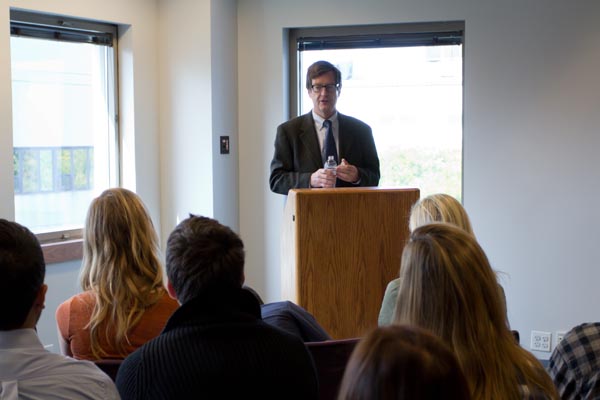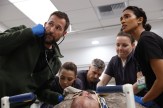The web of life for journalism

Print advertising declined for the sixth consecutive year in 2012, according to the Pew Research Center’s annual report on American Journalism. In response to the financial shortfall, many papers have cut newsroom staff, reduced print frequency, or moved from opulent headquarters to less expensive offices. In rare instances, big dailies have ceased publication.
But the newspaper industry’s market setback has also cleared a space for the burgeoning world of online journalism, the topic of a new book by Dan Kennedy, an assistant professor of journalism in the College of Arts, Media, and Design.
“Big dailies played an important role in communities, but they are shrinking,” he told about 100 students, faculty, and staff on Wednesday at a Meet the Author event in Snell Library. “When for-profit journalism fails, an entrepreneur will move in and fill at least some of the space.”
Kennedy is a nationally known media commentator and regular panelist on Beat the Press. His new book, The Wired City: Reimagining Journalism and Civic Life in the Post-Newspaper Age, explores the ecosystem of online journalism through a case study of the New Haven Independent, a nonprofit online-only news source in the eponymous Connecticut town.
Kennedy picked the Independent for three reasons: its location, its editor, and its appetite for experimentation in digital journalism. “New Haven is large enough and did serious enough journalism that I thought it was worth further exploration,” he explained. “After writing about the Boston media for so long, it was fun to go to a place I didn’t know anything about and then start reporting.”
The project took shape in 2009 at the apogee of the Great Recession. While newspapers threatened to fold in fear of the economic collapse, a plethora of Internet news sites rushed to fill the information void. One of them was the Independent, the nonprofit model of which has succeeded where its for-profit counterparts have failed: in having the resources to comprehensively cover its neighborhoods, its government, and its people.
The Independent is supported by sponsorships and local foundation grants, Kennedy said, while online-only for-profit news sources like the Bavarian in Genesee county, N.Y., must rely on ad revenue just to stay in business. “It’s easier to raise money in big chunks than to sell ads,” he said.
Following his address, Kennedy fielded questions on topics ranging from journalistic objectivity to citizen journalism in Africa.
William Kirtz, an associate professor of journalism at Northeastern, asked whether aspiring reporters could expect to make a good living in the current newspaper industry. In response, Kennedy returned to the Independent, where its full-time journalists are making as much money as their peers at other community papers. “They’re not making financial sacrifices,” he said, “but nobody is getting rich in this business.”





